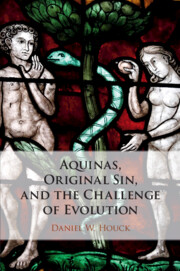'Daniel Houck's intriguing reconsideration of Aquinas's neglected theory of sin is both timely and illuminating. Not only is he able to show the distinctiveness of Aquinas's position, but also its potential for a fresh alignment with contemporary evolutionary theory. Houck is a ready exegete, a clear-thinking philosopher, and an insightful theologian of considerable learning and breadth. This is an outstanding first book from an emerging theological talent.'
Sarah Coakley, FBA - Norris-Hulse Professor Emerita, University of Cambridge
'As befits an attempt to marry dogmatic theology and modern science, Daniel Houck brings 'something old, something new' to the task of thinking through the meaning of original sin in light of challenges from evolutionary biology. Both aforementioned somethings pertain to Thomas Aquinas, from whose centuries’ old texts Houck derives a new understanding of original sin, one that represents a distinct contribution to a doctrine that otherwise stands as a shocking 'offense to reason' (Pascal).'
Kevin J. Vanhoozer - Trinity Evangelical Divinity School, Chicago
'Aquinas, Original Sin, and the Challenge of Evolution stands out among the best works in recent constructive theology. Houck retrieves and carries forward earlier Thomistic debates about original sin, as part of staking out his own position on this crucial topic in light of contemporary scientific evidence. He also explores the development of the doctrine before Aquinas, as well as the more influential contemporary proposals. A profound and timely book.'
Matthew Levering - James N. and Mary D. Perry Jr. Chair of Theology, Mundelein Seminary
‘[this book] … for anyone interested in Aquinas’s soteriology, ecumenical discussions of sin and the Fall, or the theological reception of evolutionary biology.’
Brendan Case
Source: Modern Theology
‘Daniel Houck’s book offers a notable contribution to the literature on original sin, especially, but by no means only, in relation to Thomas Aquinas. It is also noteworthy as a work at the interface between theology and science, given that Houck’s treatment of each is equally deft, with both given the detailed conceptual and historical attention they deserve … It is a particular delight to come across a work of theology so well versed in science.’
Andrew Davison
Source: International Journal of Systematic Theology



